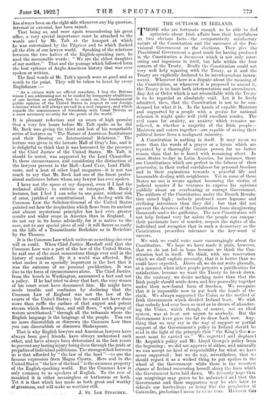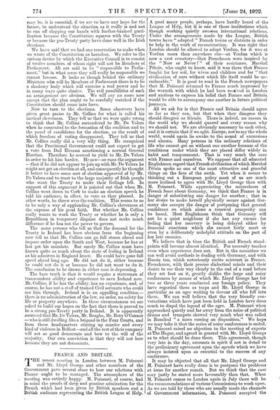THE OUTLOOK IN IRELAND. T HOSE who are fortunate enough to
be able to feel optimistic about Irish affairs base their hopefulness on two obvious facts—the comparatively satisfactory nature of the Constitution and the successes of the Pro- visional Government at the elections. They give the Provisional Government a good mark for having produced in the Constitution a document which is not only inter- esting and ingenious in itself, but falls within the four corners of the Treaty. Really the Constitution could not very well help squaring with the Treaty, as it and the Treaty are explicitly declared to be interdependent instru- ments. Whenever there is a dispute about the meaning of the Constitution, or whenever it is proposed to amend it, the Treaty is to limit both interpretation and amendment. Any Act or Order which is not reconcilable with the Treaty is to be regarded as absolutely void. Let it be freely admitted, then, that the Constitution is not to be con- demned for what it is. In the hands of capable Ministers and supported by a people with a genius for national cohesion it might quite well yield excellent results. The real cause for anxiety, an anxiety which remains un- relieved, is whether a majority of the Irish people— Ministers and voters together—are capable of saving their political house from a malignant minority.
A Constitution is nothing in itself. It may mean no more than the words of a prayer or a hymn which are repeated by a thoroughly vicious person for no better reason than that he is bored with remaining silent. In some States to-day in Latin America, for instance, there are Constitutions which are perfect in the fulness of their generosity, iu their verbal carefulness for personal freedom and in their aspirations towards a peaceful life and honourable dealing with neighbours. Yet in some of those States no one is secure against becoming the victim of judicial murder if he ventures to express his opinions publicly about an overbearing or corrupt Government. The authors of the Constitution under the French Revolu- tion aimed high ; nobody professed more humane and civilizing intentions than they did ; but that did not prevent the devotees of the Constitution from slaughtering thousands under the guillotine. The new Constitution will not help Ireland very far unless the people can conque: their passionate love of murder, respect the rights of the individual and recognize that in such a democracy as the Constitution prescribes tolerance is the key-word of
success.
We wish we could write more encouragingly about the Constitution. We hope we have made it plain, however, that we do not fail in hope because we think the Con- stitution bad in itself. We think, with one reservation which we shall explain presently, that it is better than we could have expected. Above all, we do not write gloomily, at a moment when other people perceive a justification for satisfaction, because we want the Treaty to break down. On the contrary, we desire nothing more than that the Irish people should settle down and live peaceably together under their new-found form of freedom. We recognize that it is impossible now to put back the hands of the clock. We always supported the Union as the method of Irish Government which divided Ireland least. We wish that nobody had ever been so mad as to dream of abandon- ing the Union, which though, of course, not an ideal system, was at least not unjust to anybody. But the Government have gone too far to draw back now. Any- thing that we may say in the way of support or partial support of the Government's policy in Ireland should be read in the light of the principle that " the King's Go; 4:la- ment must be carried on." We regretted and deplored Mr. Asquith's policy and Mr. Lloyd George's policy from the beginning ; we did not approve of either, and naturally we can accept no kind of responsibility for what we have never supported ; but we do say, nevertheless, that we should regard it as a wicked thing to put spokes in the wheel of the Government while there is the remotest chance of Ireland recovering herself along the lines which the Government have laid down. We devoutly hope that our misgivings may prove- to be unfounded and that the Government and their supporters may be able later to ridicule our forebodings as being like the prophecies of Cassandra, predestined never to co ne true. liosever this may be, it is essential, if we are to have any hope for the future, to understand the situation as it really is and not to run off clapping our hands with feather-brained grati- fication because the Constitution squares with the Treaty or because the pro-Treaty party have done well in the Irish elections.
We have said that we had one reservation to make when we wrote of the Constitution as harmless. We refer to the curious device by which the Executive Council is to consist of twelve members, of whom eight will not be Members of Parliament. All are said to be " responsible to Parlia- ment," but in what sense they will really be responsible we cannot foresee. It looks as though behind the ordinary Ministers who will be Members of Parliament there is to be a shadowy body which will exercise a real power and be in many ways quite elusive. The evil possibilities of such an arrangement are obvious. We will say no more now except that the plan ought to be carefully watched if the Constitution should come into force.
Now to turn to the elections. Some observers have given great praise to Mr. Collins for what is called his tactical cleverness. They tell us that we were quite wrong to think that Mr. Collins surrendered to Mr. De Valera when he consented to the formation of the coalition and to the panel of candidates for the election, as the result of which freedom of voting disappeared. They tell us that Mr. Collins really did a very wily thing. He recognized that the Provisional Government could not expect to get a vote from Dail Eireann sanctioning a normal General Election. ' Therefore, he seemed to yield to Mr. De Valera in order to hit him harder. He saw—so rims the argument —that if he did not appear to join up with Mr. De Valera he might not get an electitm at all, and consequently he thought it better to have some sort of election approved of by Mr. De Valera and to trust to the large majority of Irish people who want the Treaty to make their feelings felt. In support of this argument it is pointed out that when Mr. Collins went down to Cork to make an election speech he told his audience, in effect, to vote as they pleased. In other words, he threw over the coalition. This seems to us to be only a way of applauding Mr. Collins's cleverness at the expense of his good faith. But whether Mr. Collins really wants to work the Treaty or whether he is only a Republican in temporary disguise does not make much difference if he has not the power to govern.
The same persons who tell us that the demand for the Treaty in Ireland has been obviousi from the beginning now tell us that Mr. Collins can go full steam ahead and impose order upon the South and West, because he has at last got his mandate. But surely Mr. Collins must have known quite as much about the state of feeling in Ireland as his admirers in England know. He could have gone full speed ahead long ago. He did not do it, either because he could not do it or because he did not want to do it. The conclusion to be drawn in either case is depressing. The bare truth is that it would require a statesman of transcendent ability and experience to save Ireland now. Mr. Collins, if he has the ability, has no experience, and, of course, he has not a staff of trained Civil servants who could see him through. Ireland is in an appalling condition— there is no administration of the law, no order, no safety for life or property anywhere. In these circumstances we are asked to build our hopes on the fact that there is proved to be a strong pro-Treaty party in Ireland. It is apparently assumed that Mr. De Valera, Mr. Brugha, Mr. Rory O'Connor —who is still dwelling like a brigand in the Four Courts, and from those headquarters stirring up murder and every kind of violence in Belfast—and all the rest of their company will act as good democrats and bow to the will of the majority. Our own conviction is that they will not bow because they are not democrats.



































 Previous page
Previous page